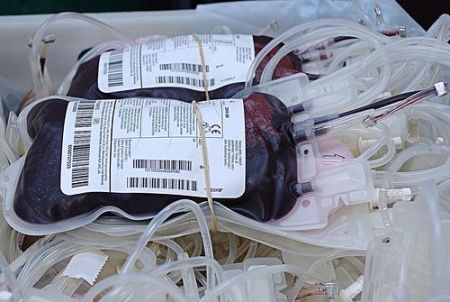Red blood cell (RBC) transfusions appear to be associated with lower mortality in patients with severe sepsis and septic shock, researchers in Korea have evaluated.
The study headed by Dr. Park used data from the Korean Sepsis Registry System to evaluate the effects of transfusions on mortality in 1,054 patients with community-acquired sepsis and septic shock. In this patient population, 407 (38.6%) received a blood transfusion, while 647 did not.
The research took place in 22 medical and surgical intensive care units in 12 teaching hospitals in Korea, and involved a propensity-matched analysis of a prospective observational database (April 2005 to February 2009).
The mean pretransfusion haemoglobin level in the group that received RBC transfusions was 7.7 +/- 1.2 g/dl. Transfused patients had higher 28-day (32.7% vs. 17.3%; P<.001) and in-hospital (41.3% vs. 20.3%; P<.001) mortality rates, and a longer duration of hospital stay. However, transfused patients were more severely ill at admission.
In 152 pairs matched according to the propensity score that depends on patient transfusion status, blood transfusion was associated with significant advantages.
Transfused patients had a lower risk of 7-day (9.2% vs. 27.0%), 28-day (24.3% vs. 38.8%), and in-hospital (31.6% vs. 42.8%) mortality rates. After adjusting for blood transfusion as a time-dependent variable in multivariable analysis, blood transfusion was independently associated with lower risk of 7-day (hazard ratio 0.42; 95% confidence interval 0.19-0.50), 28-day (hazard ratio 0.43; 95% confidence interval 0.29-0.62), and in-hospital (hazard ratio 0.51, 95% confidence interval 0.39-0.69) mortality.
In this observational study of patients with community-acquired severe sepsis and septic shock, red blood cell transfusions were associated with lower risk of mortality.
These results are in line with the results of previous studies in medical and/or surgical ICU patients, including the SOAP study and the Sakr study.
Dr. Park said. "RBC transfusion should not be based on hemoglobin concentration. Decision for RBC transfusion should be based on an individual patient's intravascular volume status, evidence of shock, duration and extent of anemia, and cardiopulmonary physiologic parameters."
Source: http://bit.ly/Rg1YGA
Image: montuno | flickr
Latest Articles
Red blood cell (RBC) transfusions appear to be associated with lower mortality in patients with severe sepsis and septic shock, researchers in Korea have e...























